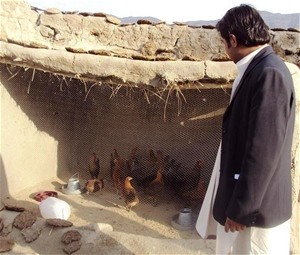
An agriculture advisor monitors the assembly of chicken coops that will house chickens distributed to impoverished women in Mendrawol Village, Laghman Province.
Dr. Zahir, NPO/RRAA
USAID provides income opportunities for 1,200 poor families living along new roads in eastern Afghanistan.
USAID’s Integrated Livestock, Beekeeping, and Poultry Assistance Project is providing sustainable livelihoods for families living along strategic provincial roads. Each of the 400 beneficiaries will receive honeybee boxes, goats, or chickens along with training for care and marketing.
13 JUNE 2010 | LAGHMAN PROVINCE, AFGHANISTAN
The economy of Afghanistan has always been agriculture-based, with most of the country’s rural areas dependent on livestock rearing, crop cultivation, and orchards. To improve production and strengthen rural economies, USAID funded a project that provides animal husbandry training and goat and chicken distribution to women in need of assistance.
According to local Afghan custom, the household or men generally own livestock, while women own chickens and goats. In agricultural areas, community leaders and local authorities worked with USAID to select the most vulnerable beneficiaries to participate in the project.
Miriam* is one of many poor women who seized the opportunity to earn additional income. She lives with her elderly husband in the village of Mendrawol in Laghman Province. Years of subsistence-level farming had impoverished the couple, and Miriam knew she had to find a way to protect her family.
Along with other women from her community, Miriam received training in animal husbandry and received 20 chickens to start her own poultry business. After three months, Miriam’s chickens started laying eggs at a rate of about 16 eggs per day. Now, Miriam earns 128 Afghanis (approximately $2.50) per day by selling the eggs in the local market. This additional income allows Miriam to provide food for her family and meet other basic needs. If Miriam does not need to sell the eggs or use them for food, she can leave them under her hens. The baby chicks that hatch will grow up to lay their own eggs, thus multiplying her hens and further increasing family income.
Community development activities, such as this one implemented as part of the Strategic Provincial Roads – Southern and Eastern Afghanistan project, foster support and ownership of USAID-constructed roads and provide sustainable employment once the roads are constructed.
*Miriam is a pseudonym given to the woman for the sake of her personal security.







Comment
Make a general inquiry or suggest an improvement.